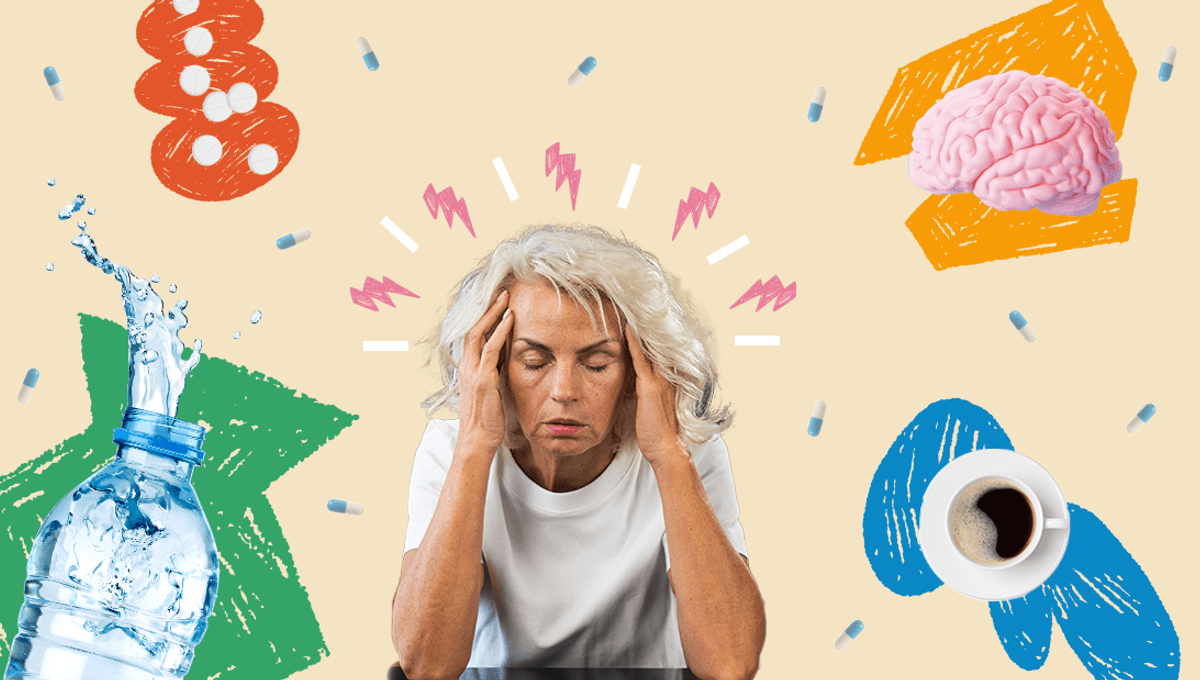
We’ve all experienced a headache at some point, and no doubt many of us have googled our symptoms and concluded our death was imminent. Thankfully, while they might be unpleasant, most headaches aren’t so nefarious – but why do we get them in the first place?
There are so many different types of headache that covering them all and their possible causes could easily become a dissertation, so to save you time, we’re going to go through five, including some of the most common.
These can be split into primary headaches, which occur on their own, and secondary headaches, which are instead a symptom or sign of an underlying condition.
Primary headache
Tension
Tension headaches are often considered to be the most common type of headache and what most of us will think of when it comes to headaches – dull, pressure-like pain that feels like you’ve got a tight band around your head.
The exact cause of this kind of headache isn’t known and anyone who’s experienced a tension headache will know that they can happen under all kinds of circumstances, such as stress, clenching your jaw, or even holding your head in the same position for too long.
Historically, scientists thought tension headaches were the result of muscles tightening up in your shoulders, neck, and head when tense (hence the name), but more recently, it’s been argued that they might be the result of an increase in pain pathway-activating chemicals in the brain.
Migraine
Migraine is in a league of its own within this category. Although it’s classed as a primary headache condition, migraine doesn’t necessarily equal having a headache – lots of people experience migraines without one.
But when it does come with head pain, it can get pretty intense, often involving a throbbing sensation, sticking to one side and lasting for several hours.
Despite more than 10 percent of people worldwide estimated to be affected by migraine, researchers don’t really know what causes it. There are well-known potential triggers, such as certain changes in the weather, certain foods, and lack of sleep, but on a physiological level, scientists have been unable to determine much beyond it potentially involving changes in the brain’s blood vessels and balance of signaling molecules called neurotransmitters.
Cluster
Compared to the previously mentioned types of primary headache, cluster headaches are rare. What they lack in prevalence, however, they more than make up for in the strength of their symptoms; they’re characterized by sudden and severe pain on one side of the head, often around the eye, sometimes accompanied by swelling or droopiness of the eyelid.
Like tension headaches and migraines, scientists don’t know for sure what causes cluster headaches, but it’s believed to involve the release of neurotransmitters and neuropeptides in three key components in the brain: the trigeminovascular pathway, the trigeminal–autonomic reflex, and the hypothalamus.
Secondary headache
Dehydration
A heavy night out at the bar or forgetting to drink enough can land you with a nasty dehydration-induced headache – but quite how that happens is unclear.
“Dehydration alone may cause headache, but oftentimes exacerbates underlying medical conditions such as primary headache disorders or other conditions dependent on fluid balance,” one 2021 paper notes.
One theory about the relationship between dehydration and headaches involves the meninges, the membranous layers that cover the brain. Unlike the brain, these layers have pain receptors; the theory goes that the movement of fluid out of the brain in response to dehydration puts tension on the meninges, triggering the pain receptors and giving you a headache.
Caffeine
Caffeine has a fickle relationship with headaches; it can ease them but also end up leading to them, and it comes down to how consumption of caffeine can affect blood vessels in the brain.
In some cases, headaches are related to the widening of blood vessels in the brain, increasing blood flow around the organ and putting pressure on nerves, which respond by sending pain messages to the brain.
Some painkillers contain caffeine – this addition “confers an additional benefit amounting to an extra 5% to 10% of patients achieving a good level of pain relief”, according to a 2014 review.
It causes blood vessels to narrow, which can help ease headache pain. On the flip side, if you consume caffeine regularly and suddenly stop, that can lead the blood vessels to dilate instead, landing you with a withdrawal symptom in the form of a headache.
When to seek medical care
While most headaches shouldn’t be cause for concern, there’s a particular circumstance when medical attention should be sought immediately – when a headache comes on suddenly and is extremely painful.
This is known as a thunderclap headache, and can also be accompanied by nausea, vomiting, and an altered mental state. This type of headache can be a sign of something life-threatening going on in the brain, such as the rupturing of a blood vessel, blood clots, or an infection.
All “explainer” articles are confirmed by fact checkers to be correct at time of publishing. Text, images, and links may be edited, removed, or added to at a later date to keep information current.
The content of this article is not intended to be a substitute for professional medical advice, diagnosis, or treatment. Always seek the advice of qualified health providers with questions you may have regarding medical conditions.
Source Link: 5 Types of Headache And What Causes Them